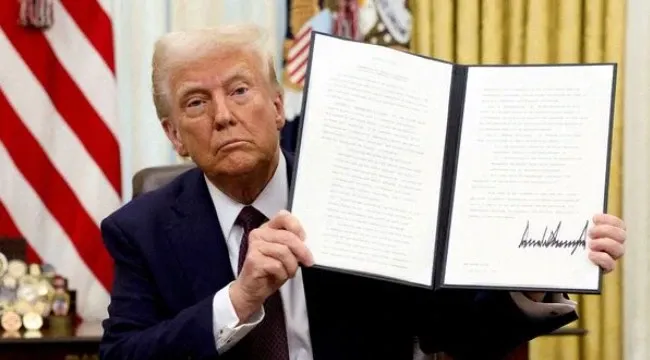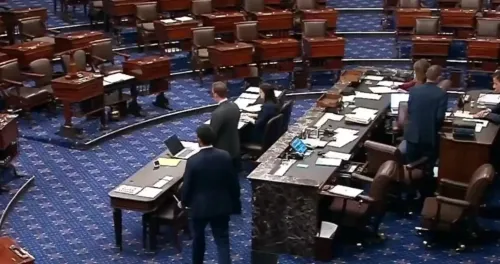Did the US House of Representatives Just Pass a Major Tax-Cut Bill?

Synopsis
Key Takeaways
- The House passed a significant tax-cut bill that could impact the national debt.
- It extends previous tax cuts from Trump's presidency.
- Increased defense spending is included in the legislation.
- Green energy policies from the Biden administration are repealed.
- Budget groups express concerns about fiscal responsibility.
Washington, May 23 (NationPress) The Republican-led US House of Representatives has narrowly approved a comprehensive tax and spending bill, despite earlier warnings from budget advocacy groups about its potential to substantially increase the federal debt.
The legislation passed by a close vote of 215 to 214, as reported by Xinhua news agency.
All Democratic representatives, along with two Republican members, opposed the bill, while one Republican chose to vote "present," thus neither supporting nor opposing it.
This bill not only extends the corporate and individual tax cuts first enacted during President Donald Trump’s initial term in 2017, but also introduces new tax incentives for tips, overtime, and car loans.
Moreover, it boosts defense spending and designates additional funds for the deportation of immigrants.
Additionally, the legislation reverses numerous green energy policies advocated by former President Joe Biden and raises the eligibility thresholds for low-income individuals seeking access to healthcare and food assistance programs, aiming to curb federal spending.
The bill will now be forwarded to the Republican-led Senate, where it is expected to undergo alterations.
“THE ONE, BIG, BEAUTIFUL BILL has passed the House of Representatives! This is arguably the most significant piece of legislation that will ever be signed in the history of our country!” Trump stated on his social media platform, Truth Social.
Conversely, budget groups have voiced serious concerns.
“The House's reconciliation framework is a serious blow to fiscal responsibility, adding over $3 trillion to the debt and creating a huge cliff of tax cuts and spending expirations that could cost trillions more to extend,” Maya MacGuineas, President of the Committee for a Responsible Federal Budget, said in a statement on Wednesday.
Recent data from the Treasury Department indicates that the US national debt has exceeded $36.2 trillion.
With a slim House majority of 220-212, Speaker Mike Johnson had limited flexibility for dissent and made last-minute compromises to appease various Republican factions.
Johnson characterized the bill as “generational, truly nation-shaping legislation,” highlighting its importance in determining America’s future.
The 1,100-page bill solidifies many of Trump’s populist campaign promises, including new tax breaks for tips and car loans, heightened military spending, and stricter border enforcement.
The legislation extends the tax cuts for corporations and individuals introduced in 2017 while eliminating several green energy incentives put in place by former President Joe Biden.
However, the Congressional Budget Office (CBO) forecasts that this tax-cut bill will add an estimated $3.8 trillion to the federal debt over the next decade, compounding the current debt of $36.2 trillion.









